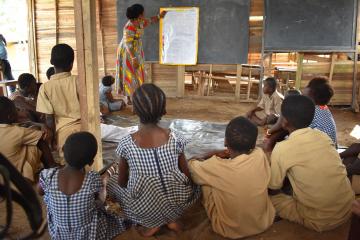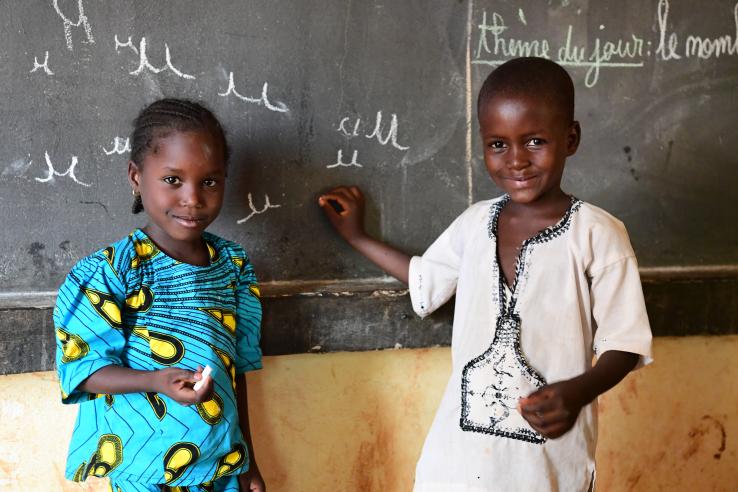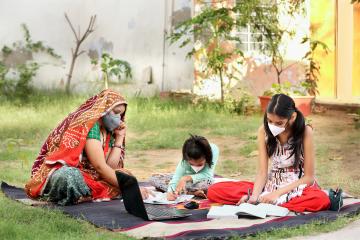
Foundations for student success: Focusing on functional literacy and numeracy

A staggering 1.6 billion children were out of school for extensive periods of time due to the COVID-19 pandemic. Many of these children have not only missed out on many months of education critical to their intellectual and cognitive growth but are at risk of simply forgetting previously acquired learning. Some children will drop out of school altogether.
Learning loss puts an entire generation of children at greater risk of poverty, exploitation, trafficking, and violence. As with any emergency, poor and marginalized children will bear the brunt, especially those in fragile and conflict-affected states. For many children, barriers to education are not new. The pandemic has only exacerbated a pre-existing learning crisis; namely, a lack of basic literacy and numeracy skills. More than half of children in low- and middle-income countries are not able to read and understand a simple story by age 10, write or do basic mathematics. In the poorest countries, the level is as high as 80 per cent. Without these basic skills, children’s subsequent opportunities are limited.
Children need a strong foundation to proceed through the education system. Being able to read with understanding and solve problems confidently boosts a child’s own confidence in her or his own capability to progress and inspires supporting efforts from teachers, parents and caregivers.
As countries reopen schools, there is a critical opportunity to build forward better. We need bold actions to strengthen education systems so that every child has access to equitable and quality education experiences. This must include prioritizing foundational literacy and numeracy (FLN) for all children.
To support education systems to focus on FLN, UNICEF is partnering with The Abdul Latif Jameel Poverty Action Lab (J-PAL at MIT), Pratham, and Delivery Associates. At this critical moment, this partnership is making a big push to help children to achieve FLN by age 10, with solutions that work quickly and at scale. As schools reopen, this means focussing on quickly assessing children as they re-enter school to meet them at their level and supporting children to master the most foundational skills once schools reopen.
In practice this means:
- Assessing what children know, using simple, rapid, one-on-one, inexpensive tools to understand where children are in their learning;
- Setting short-term reading and arithmetic goals and assessing progress to take corrective action;
- Building on evidence-based FLN programmes, such as supporting teachers to meet children where they are by tailoring instruction to their level and in languages they understand;
- Ensuring a strong focus on remedial support to help children catch-up;
- Attending to the wellbeing of children, including activities and approaches that help to address the mental health and psychosocial needs of children; and
- Enhancing school-home connections by providing information to parents and caregivers and engaging them in at-home learning activities.
Amongst all the other urgent priorities that have been thrown up by the pandemic, this sharpened focus on FLN is critical for two main reasons. First, it aims to improve children’s FLN skills in a short period of time. We can get children back to basics to help them open up their educational opportunities. Second, it draws on the experience of implementing partners, building on existing FLN evidence-based programmes and resources – and initiating new efforts based on the context of each country.
This is complemented by the longer-term objective of strengthening education systems. Delivery Associates will provide training and tools to strengthen the capacity of education stakeholders across all levels. The partnership will also invest in systems for monitoring actions and managing data to ensure inputs are being translated into meaningful, measurable results. Finally, the critical need for sustainability and ownership will mean we will actively engage with:
- Leaders who commit to improving foundational reading and mathematics outcomes;
- Teachers and educators who are well-trained and supported to effectively meet learners where they are by helping them master literacy and numeracy skills at the right level and in languages they understand;
- Learners whose holistic and developmental needs are met by schools and learning environments offering essential integrated services – in health, nutrition, social protection; and water, hygiene and sanitation; and
- Parents and caregivers who demand quality education, value playful learning and are able to take an active role to their child’s literacy and numeracy skills development at home.
This initiative is about helping children to explore their potential and broaden their horizons. Together, by 2030, we want to ensure that at least 78 million children aged 10 or older have a solid foundation for their future learning.
This goal is ambitious. It requires a broad coalition of partners. In addition to the implementing organizations, UNESCO, the World Bank, and the Global Partnership for Education (GPE) have come on board to provide generous support. They need to be joined by the global education community, governments, families, donors and communities. Together, we can start to address the massive learning loss created by the COVID-19 pandemic. We can do this by using programmes that we know work to improve FLN so that every 10 year old can read, write and reason.
We have an opportunity now to strengthen foundational learning and build forward better as schools reopen. Globally, we can empower every child to reach her or his potential in education and in life, and to take part in shaping the future.
**********************
Resources:
For a look at the socioeconomic impacts of COVID-19, see the rapid situation tracking dashboard here.



